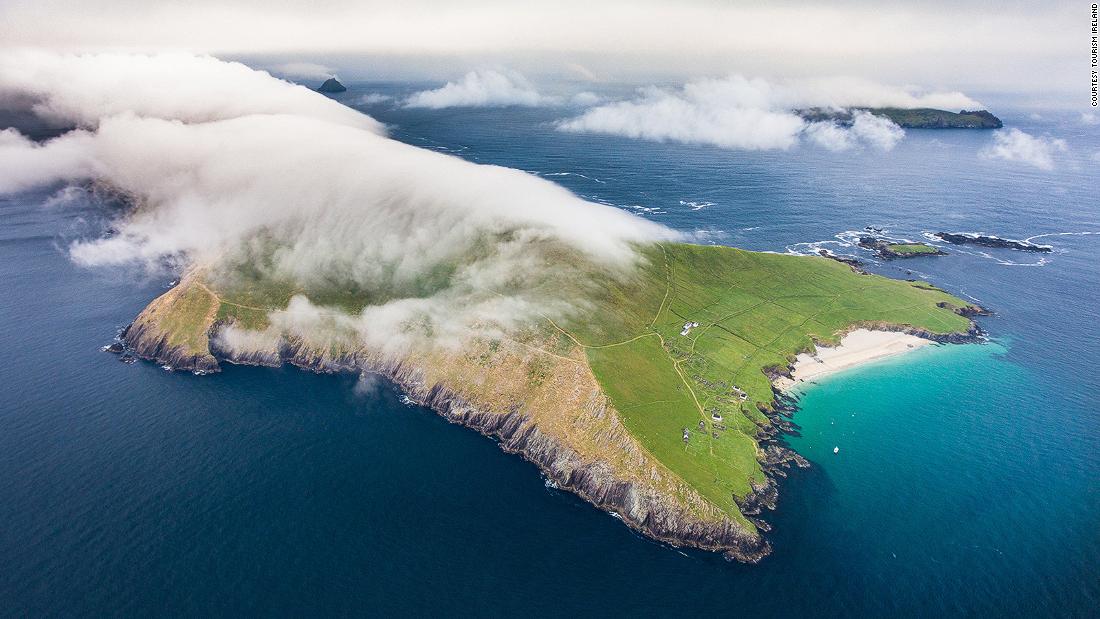Products You May Like
(CNN) — If your sweetheart turns to you tonight and whispers “shall we try for a little one?”, don’t dismiss them out of hand.
It could be they’re talking about an Irish island.
Great Blasket, on Europe’s Atlantic fringes, is seeking a couple to become summer caretakers and sole full-time residents of this unoccupied island off Ireland’s west coast.
As long as you’re not sticklers for electricity or hot running water, you’ll embrace the majestic 1,100 acres (4 1/2 square kilometers) of emerald isle as your domain.
As well as sublime views, the generous rain keeps the landscape lush and those stiff Atlantic breezes power the wind turbine that generates enough electricity to charge up your phone.
The roles, suited to a couple or two friends, involves the management of the island’s coffee shop and three vacation cottages from April to October this year. Accommodation and food are provided and wages discussed on application.
Candidates should be aware they’ll be facing some tough competition.
“We’ve had about 7,000 applications,” Alice Hayes tells CNN Travel on January 16, having posted the job vacancy online just six days earlier.
Hayes and her partner, Billy O’Connor, live on the nearby Dingle Peninsula and O’Connor runs regular boat tours to the island in summertime.
Together, the couple refurbished the islands’ cottages, one of which was home to legendary storyteller Peig Sayers, whose Irish-language autobiography “Peig,” published 1936, has been a standard text for generations of Irish students.
Sayers had “a very tough and difficult life on the island,” says Hayes, and her famously bleak book documented “the hardship she went through.”
The island’s 2019 caretakers were Lesley Kehoe and Gordon Bond. Like Sayers, they shared their Great Blasket experiences with the world — although their Instagram and Twitter accounts presented a rosier view of Atlantic living.
However, Kehoe tells CNN Travel, wannabe caretakers should take note: “What you see on social media isn’t what it’s all about.”
While she posted “pictures of bonfires, fields and sunsets,” what you didn’t see is Kehoe “running round the cottages making beds” or “queues coming out of the coffee shop.”
“You can easily forget that it gets up to 400 visitors a day,” she adds. “it can be incredibly busy.”
As for off-the-grid living, Kehoe says that while you can use your cottage’s kettle to boil water for showers, after a few days she steeled herself and got used to showering cold.
Start your morning that way, she says, and “at least you know that’s the coldest you’ll be that day.”
The water is fed by an island spring and that pure water and fresh air has its benefits. “My skin, my hair, my general health was incredible,” says Kehoe.
There’s no electricity or Wi-Fi on the island, but, surprisingly, the mobile internet reception is excellent, thanks to a mast a few miles away on the mainland.
Of those 7,000 — and counting — applications Hayes and O’Connor are now sifting through, there will no doubt be a large number of people with a romanticized view of what the job entails.
However, Kehoe says that those who know they’re the person for the task will have the “gut instinct” that they are a Blasket Islander in waiting.
She says that she and Bond were unable to return this year “for practical reasons,” but “if we could do it again, we would.”
Not only has the experience been a powerful one for her and her partner, they’ve also made lifelong friends with Hayes and O’Connor. She and Bond are now back home in Kildare, near Dublin, but plan plenty of repeat visits.
While there are those who criticize the “commercialization” of Great Blasket and its neighboring Blasket Islands, Kehoe thinks the global attention the island is receiving is ultimately beneficial.
“I think that the work Billy and Alice do to keep the island alive is so much more important than leaving it out there fossilizing. If that [industry] wasn’t there, it’d just be ruins.”

